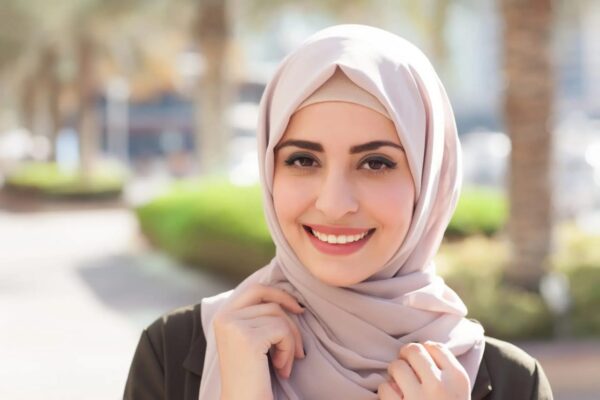
Because of many myths and misapprehensions, our society and particularly non-Muslims think that Islam is a conservative religion and does not support women’s rights and empowerment. Today, I am here to deny those misconceptions and to share true insights from Islamic teachings about how Allah has honored women with a significant and respectable status. I will share what rights women own according to Islam and how many prominent Muslim women proved themselves empowered in the pages of history.
In Islamic values, women are always respected and cared for, whether they are a mother, sister, wife, or daughter. Being a daughter, a woman is a blessing to her family, while a mother is said to have a paradise in her feet.
Arab Women’s Condition Before Islam:
Before the revelation of Islam, Arab women endured harsh treatment. They had no rights over their life decisions; they used to be mistreated by their men. Men even used to bury alive the newly born baby girls; they used to marry and divorce their wives by saying we were just kidding. The relationship of nikah was considered no more than a joke; women used to get disrespected by living with the same man who had divorced them. This was the Arab society before Islam that was totally misogynistic and humiliating for the women.
Islamic Views About Women:
Quran and Sunnah prove that women are not considered inferior to men. Allah has always stressed the fact that men and women are equal in every aspect of life, whether it is about education, inheritance, religious services, or any other goals that do not avert from the teachings of Islam. I would like to present some verses of the Quran and sayings of the Prophet (Peace Be Upon Him).

Surah An-Nisa highlights the responsibilities of men and women: “Men are the caretakers of women, as men have been provisioned by Allah over women and tasked with supporting them financially. And righteous women are devoutly obedient and, when alone, protective of what Allah has entrusted them with. And if you sense ill-conduct from your women, advise them ‘first’, if they persist, ‘do not share their beds’, but if they still still persist, then discipline them ‘gently’. But if they change their ways, do not be unjust to them. Surely Allah is Most High, All-Great.” (Verse:34)
In another chapter Quran says: “So their Lord responded to them: I will never deny any of you – male or female – the reward of your deeds. Both are equal in reward.”
“And for women are rights over men similar to those of men over women.”
Our beloved Prophet (Peace Be Upon Him) addressed in His last pilgrimage of Hujjat-ul-Wida at Arafat: “O people, it is true that you have certain rights with regard to your women, but they also have rights over you. Remember that you have taken them as your wives only under Allah’s trust and with His permission. If they abide by your right then to them belongs the right to be fed and clothed in kindness. Do treat your women well and be kind to them for they are your partners and committed helpers. And it is your right that they do not make friends with anyone of whom you do not approve, as well as never to be unchaste.”
Prophet (Peace Be Upon Him) says: “The most complete believer in faith is the best in morals, and the best among you is the best to their wives.” (Tirmidhi)
Hazrat Aisha (R.A.) narrates that Saudah bint e Zamah once went out at night; Umar saw her and asked her, “O Saudah, why do you not hide yourself from us?” Saudah went to the Prophet (Peace Be Upon Him) at once and told him about it. Prophet replied, “It is permitted by Allah for women to go out for their needs.”
It actually shows that Islam is not a somewhat strict religion that stops women from going out for their needs, work, and education. It is just some superstitions and misinterpretations that portray it as a cliched religion.
Rights of Women in Islam:
Islam has provided women with each and every right that they were not granted in the time of illiteracy before Islam, from education to property inheritance and freedom of choice for their lives.
• Right of Choosing Life Partner: Choice of marriage is a primary right of every individual, particularly women, who are deprived of this basic right and often get imposed a partner by their family without even their consent. This is considered normal in our society, but these practices should be demolished, and asking for the choice and consent of a girl should be mandatory as it is ordained by Allah and
our Prophet.
• Right of Property Inheritance: Islam imposed the law to inherit the share of women in her ancestors’ property, which was not granted before, and they were used to consider her ineligible for her father’s inheritance as she has to marry off to someone else. But Quran denied it and said: “For men there is a share in what their parents and close relatives leave, and for women there is a share in what their parents and close relatives leave – whether it is little or much. These are obligatory shares.”
• Right of Education and Work in Society Alongside Men: According to the Quran and Hadith, education is mandatory for men and women. Both are equally responsible for virtuous deeds and social reform.
In Surah Ahzaab, Allah says: “Surely for Muslim men and women, believing men and women, devout men and women, truthful men and women, patient men and women, humble men and women, charitable men and women, fasting men and women, men and women who guard their chastity, and men and women who remember Allah often—for all of them Allah has prepared forgiveness and a great reward.” (Verse: 35)
This verse defines the equality of men and women in every aspect of life according to the principles of Allah Almighty and shows how women are not to be created to stay behind and limited to the homes described by our society.
In another verse and chapter Quran says about the equality: “Never will I allow to be lost the work of (any) worker among you, whether male or female; you are (members) of one another.”
Responsibilities of Women in Islam:

• Responsibility of Education and Learning: Education and learning are mandatory for every living being, including women, as they are the society representative and spend more time with children and their training. A good and righteous education that benefits her personality, grooming, home, and society is essential for her. It also benefits her to become a useful member of society, especially for her family and herself in times of need or crisis.
• Family Responsibilities: One of the primary responsibilities of women is their family. Islam has ordained women to take care of home and children and provide support to their husbands in every problem when needed. Women are responsible for protecting the house in the absence of husbands and for staying honest with their husbands in every matter of household.
• Social Responsibilities: Just like men are part of society and contribute to works, welfare, and matters of the society, women are also part of it. For implementing Islamic principles, one needs to interact in society more, as Islam and worldly matters go hand in hand. Women should work as employees and businesspersons to participate in the economy of the country as well as supporting their families.
They should also be interactive in society to utilize their capabilities for better causes and welfare in order to make society a better place to live.
• Responsibility of Promoting Morality and Justice in Society: Women are the equal part of society as men, and they also own prominence in leading a society and have great impacts of their acts on it. They should influence society with their good deeds and acts. Women should be more inclined towards adopting and promoting these virtues, as they are homemakers and train the children more than
men; they should be a role model for their children and other members of home and society to promote good morals.
These are some primary responsibilities of both religious men and women. I think women should be more inclined towards religious responsibilities, as they are considered more vulnerable and insignificant in our society, unfortunately. Going ahead in worldly and religious aspects of life can give them back their importance and powerful image.
Debunking Myths:
There are some myths or misinterpretations about some matters related to Islam that I want to debunk today:
One of the most talked-about and discussed topics is Halala, which is said to be against women’s dignity and honor. People think that Halala (one-day nikkah with someone else to marry an ex-husband) is an Islamic concept. But it is definitely not! Islam imposed this principle of marrying another man instead of marrying another ex-husband to actually protect women’s lives and dignity. In older times, Arabs used to take marriage as a joke by divorcing their wives and yet living with them or remarrying them; Islamic teachings declared not to live again with the person after divorce and encouraged women to marry another man after the Iddah (3 months and 10 days) period to protect them from being a joke to their husbands. While a woman can remarry her ex-husband after another divorce or death of a second husband if she wants to or both realize that the decision was not good. Unfortunately, many people even started using this principle for their own benefits and normalized one-day nikah for the intention of remarrying an ex-wife, which is actually prohibited in Islam, and there is no justification for this disgusting act.
Hence, it proved that Islam does not support disrespecting women but encourages laws that are highly in favor of women and their dignity.
Another argument is over women working outside the home and their dress code. Many people still consider that Islam neglects women working in society for their goals and careers. But you can see the example of many verses and sayings of the Prophet (Peace Be Upon Him) that women are equally responsible for the welfare of society and religious works; then how one can say that women are considered to be confined to homes and should not work outside?
Women have full rights to work for their goals while adhering to the Islamic laws prescribed by Allah. Women can also manage their homes and work for their careers together if their family and partner are supportive instead of becoming their greatest hurdles. Women are much more powerful than anyone can even think; they can do everything they want. Meanwhile, the dress code should be modest and not revealing; if the dress code is ethical, then there is nothing wrong with working in society alongside men. Other than that, people do not owe to judge women whether they should veil their face or not, whether they are doing hijab or not; these things are matters between Allah and creatures not concerned with society members to poke their nose into every other matter and pass judgments, which is also prohibited in Islam.
Strong and Empowered Women in the History of Islam:
There are countless names of Muslim women who are living examples of empowerment and strength in the pages of history. Let’s know a few of them, as we cannot discuss all of them.
• Hazrat Khadijah (R.A.): As we all know, Hazrat Khadijah Bint e Khuwaylid was our Prophet’s first and beloved wife, a successful businesswoman of Arab times. She had great qualities to run a trade business on her own with abilities and virtues like intelligence, honesty, and leadership. She also remained side by side with our Prophet in the early days of revelation, being her greatest support as a life partner. She is the primary example for today’s women to stay strong towards their goals as well as supportive for their partners and families.
• Hazrat Aisha (R.A.) Bint e Abu Bakr: She was a second wife of Prophet (Peace Be Upon Him) and a great scholar and teacher. She narrated numerous Hadiths (sayings of the Prophet) and educated countless companions (Sahaba Karam) of the Prophet about Islamic teachings. She taught numerous men, women, and children while staying in her Hujra (living place). Hazrat Aisha is definitely a
prominent figure with great intellectual and political views.
• Rufaida Al-Aslamiya: She was the first female Muslim nurse and surgeon in the history of Islam who served the Muslim soldiers and Mujahideen by providing them medical healthcare in wars in the time of the Prophet (Peace Be Upon Him). She is a living legend of the earliest Islamic period who showcased bravery and support for the Muslim brothers in the war, debunking the myth of women being weak.
• Asma Bint e Abu Bakr: She was a sister of Hazrat Aisha, who showed her bravery and strength during migration. She risked her life and delivered food and other supplies to Prophet (Peace Be Upon Him) and her father (Hazrat Abu Bakr) when they were hiding from the residents of Mecca who wanted to kill them. Her bravery remained the same for fighting against oppressive rulers later.
Such are the inspiring examples of Muslim women who were the true image of resistance, strength, empowerment, and support. After getting to know about these examples of bravery and strength, is there any doubt to not consider women empowered? I hope the answer will be no!
Women should never fear anyone other than Allah. If we get to know our worth, we will realize that we are the most powerful creation who can do anything in this world for good causes. We should always trust in Allah and should keep going ahead for our goals, whether we face hurdles and superstitions from society. If we try, we are so powerful that we can even conquer the world and make it a better place with our love and strength.


Blogger
